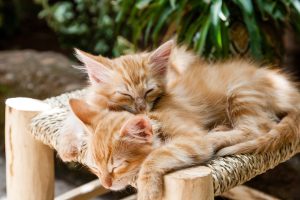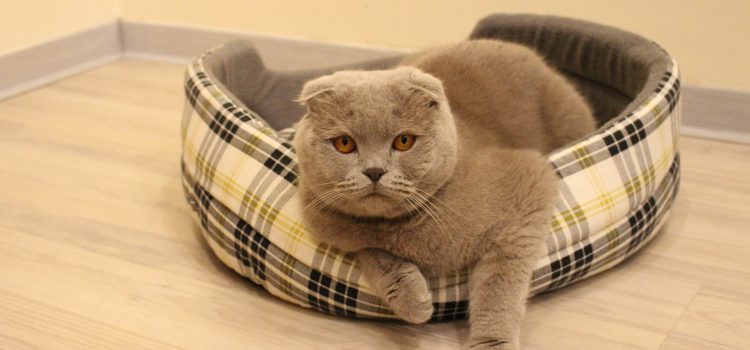
Why is My Cat Peeing on My Bed ? What Can I Do?
The following is a list of why cats might be peeing on your bed:
- – You leave the litter box too dirty or clean.
- – The litter box is too small, too far away, or in an inconvenient spot.
- – Your cat doesn’t like the type of litter you’re using.
- – There need to be more litter boxes in your house.
- – Your cat associates the smell of urine with a place where they feel safe and secure (like their own bed).
- – You must clean up after your cat when they use the bathroom outside the litter box.
- – Your cat has a urinary tract infection or other medical issues that cause them to pee outside the litter box more often than usual.
- – Your cat doesn’t like the feel of its litter box.
- – Your cat has been spayed or neutered, and now you’re seeing more peeing outside the litter box because of the lack of hormones in their body.
- – Your cat is stressed out and peeing more to release tension.
- – Your cat has too much litter in the box, or your litter needs more absorbent material in it. If you think your cat might be peeing on your bed because of the smell, try cleaning up after him more often so he doesn’t associate that smell with a place where he feels safe and secure.
- If your litter doesn’t have enough absorbent material, you should switch to a different brand or add more litter.

Causes and Symptoms of Cat Inappropriate Urination
Cat inappropriate urination is a common problem in cats. Various issues, such as urinary tract infections, diabetes, kidney disease, and bladder stones, can cause it. The most common symptoms are persistent urination and blood in the urine.
Cats with this condition often lick their genitals excessively or have an unpleasant smell around their genitals.
Urinary tract infections are the most common cause of inappropriate urination in cats. Infections can also be caused by stones in the bladder, which can result from diabetes, kidney disease, or other medical conditions. Males often have foul-smelling urine and excessive licking of their genitals. Females may have blood in their urine and spend time licking their genitals excessively.
There may be signs of pain if there is a urinary tract infection or stones, such as constant crying or reluctance to move.

Common Diseases/Issues That Could Cause Your Cat to Pee Outside Their Litter Box
Cats are usually very clean creatures, but some can cause them to pee outside the litter box. Below are a few examples of common diseases and issues that could cause your cat to pee outside their litter box.
- Urinary tract infection: Cats with urinary tract infections often have blood in the urine, will stop using the litter box, and may act restless or aggressive.
- Diabetes: Cats with diabetes may drink more water than usual and urinate frequently or in large amounts; they also may not eat as much as they usually do and may lose weight or act lethargic.
- Kidney disease: Cats with kidney disease often display vomiting, loss of appetite, lethargy, weight loss, frequent urination (especially at night), and increased thirstiness. They also might have blood in their urine or produce a lot of foam when they urinate.
- Bladder stones: The most common symptom of bladder stones is difficulty urinating, which could lead to episodes of urinating outside the litter box.
- Anal sac disease: Anal sac disease can cause frequent and painful episodes of “scooting” that can last for days, weeks, or months. This often occurs when a cat stops using the litter box and starts repeatedly scratching its bottom to relieve pain or itching.6. Irritable bowel syndrome: Cats with irritable bowel syndrome may have a combination of symptoms such as vomiting, diarrhea, weight loss, and a change in appetite.
- Polyps: A polyp is a growth on the wall of the gastrointestinal tract that can cause obstructions and intestinal blockages. Some polyps might be small enough to pass through without causing any problems. Still, others are usually large enough to cause symptoms such as vomiting or diarrhea when they become impacted by food or other material in the intestine.
- Pancreatitis: Pancreatitis is a health condition characterized by acute inflammation of the pancreas. The pancreas is a gland that makes enzymes involved in digestion. It’s also important to note that pancreatitis can cause vomiting and diarrhea. Still, most cases are not that severe and don’t cause these symptoms.
- Biliary Tract Disease: Gallstones are small stones made of cholesterol, bile salts, and other substances found in the gallbladder. They’re usually present as bile accumulates in a narrow duct.
- Bile Duct Obstruction: This causes severe pain in the back, right side of the abdomen, and sometimes the upper right-hand quadrant of the stomach. The pain is usually worse when you swallow.
- Constipation: This condition is characterized by infrequent bowel movements with hard, dry stools and incomplete bowel emptying. The biliary tract includes tubes carrying bile from the liver to the small intestine via the common duct. Bile duct blockage can be congenital or caused by scar tissue, trauma, or infection.
What Makes Cats Stop Inappropriate Urination?
Many people have cats, but not all are happy with their cat’s behavior. One of the most common complaints is inappropriate urination. The problem is that cats may be doing this for many reasons, and it can be hard to know the cause.
It’s essential first to understand how cats mark their territory. Cats will urinate on things they want to claim as theirs or that they feel threatened by. You should know that when a cat starts spraying urine around, it could be a sign of urinary tract infection or other medical issues. Other times, the cat may just be expressing their displeasure with something in the environment or an owner’s behavior.
To stop your cat from urinating inappropriately, you’ll need to identify what might be causing this behavior and then take steps to fix it accordingly. It’s essential to try to figure out what might be causing your cat’s inappropriate urination before taking steps to stop it. Consider the following reasons why a cat may spray:
1) They feel threatened by something in their environment, such as new furniture or a new family member
2) They’re unhappy with something they smell (such as you cooking fish), or they sense that there is an intruder in their territory
3) They are feeling stressed and are releasing that stress to feel better.
















